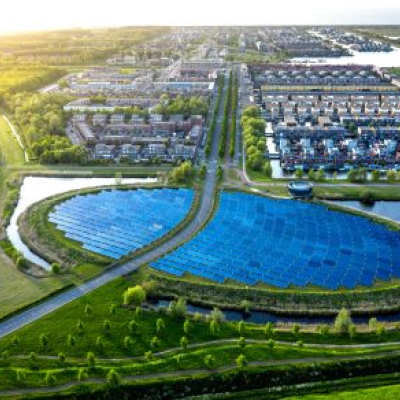Este artículo también está disponible en Español.
Unsustainable consumption and production patterns are at the heart of the triple planetary crisis: climate change, biodiversity loss and pollution. Environmental degradation has become even more evident during the COVID-19 pandemic, highlighting the fragility of our societies. The EU and UNEP are joining forces with multiple stakeholders to ensure a greener future.
Half of the world’s biodiversity is found in the Latin America and the Caribbean (LAC) region. This region also leads globally in protected marine and terrestrial areas. Thus, LAC is critical to achieving Sustainable Development Goal 121. The EU recognises the geopolitical priority of this region for green development and has launched a working collaboration with the United Nations Environment Programme (UNEP) to support initiatives in biodiversity, climate change, pollution, waste management, and circular economy2.
The project Driving Sustainable Consumption in Latin America with Better Product Information and Design (ICSAL) – using a holistic approach – provides final consumers with simple tools and mechanisms for eco-friendly options in choice of products or services by:
- working with public authorities on the normalisation of rules established by the International Organisation for Standardisation (ISO) according to their national and regional needs;
- supporting and ensuring the independent and competent products’ certification process by companies;
- advocating for the accreditation process of the above-mentioned steps based on the LAC regional eco-label through the Environmental Alliance of America3.
Best practices of the EU-UNEP project ICSAL:
- Involving relevant stakeholders in the prioritisation of products and services for which certification and accreditation in LAC is needed;
- Ensuring the participative and collaborative role of the private sector;
- Integrating and innovating with the young population to bring change
1. Involving relevant stakeholders in the prioritisation of products and services for which certification and accreditation in LAC is needed
The Environmental Alliance of America wants to ensure that LAC products, processes, and services are recognised as green products, both in the region and in the international market. For this reason, the starting point is to normalise the ISO regulations within the priorities of each member of the alliance. Ignacio Sanchez Diaz, Resource Efficiency Officer at the UNEP office in LAC, explains, “ICSAL is assisting this joint decision-making of public authorities, independent certification, accreditation entities and the private sector in identifying opportunities, risks and prioritising.”

Luis Rodriguez, Eco-labelling Manager of the Environment and Energy Ministry of Costa Rica, agrees that “this intense collaboration of relevant stakeholders leads to a fruitful partnership in which the diversity of voices has allowed us to have a better perspective and decide on the right direction to take.”
This democratic and inclusive dialogue is carried out through technical working groups and meetings. All parties have the same rights and obligations to agree on the rules for the region and on the products that need to be certified in priority. This process is a fundamental element of the alliance, but is not without challenges. Dialogue can often delay urgent certification, and politics sometimes contradict the objectives of the ICSAL project. “COVID-19 delayed some decisions, but this is not our only obstacle. For example, national elections and the appointment of new governments are also barriers to the team needing to agree on priorities and build trust,” explains Ignacio Sanchez Diaz.
2. Ensuring the participative and collaborative role of the private sector
The proactivity and willingness of the private sector are essential to the sustainable implementation of the project. Ignacio Sanchez believes, “it is time to change the idea that sustainability is more expensive for the company. On the contrary, green productivity incurs fewer costs and allows new and better business opportunities.”
The cost-effectiveness of eco-labelling impacts the coffee industry; one of the most strategic markets in the region, with more than 15 countries manufacturing this product. Luis Rodriguez explains, “a regular producer has to pay for at least four different certifications to sell on the international market. This costly certification process won’t be needed anymore once there is an agreed single certificate for the whole production of coffee in the region, making it cheaper and more efficient.”
Eco-labelling also helps to build international trust. Luis Rodriguez highlights the results of a pilot coffee project in Costa Rica. “We decided to sell average quality beans at an international auction using an eco-label specifying the footprint of this specific product on the environment4,” he continues. “The price paid was 46% higher than for any other coffee.”

ICSAL supports more than 120 companies – through training and technical assistance – to build their capacity and promote a circular economy, life cycle planning and eco-labelling. This participative training involves multiple industries at national level, enabling them to network and share experiences. “This dialogue leads to business opportunities. For example, our training in Mexico facilitated the potential collaboration between one leading global company delivering food and a small company producing eco-friendly packaging,” says Ignacio Sanchez Ruiz proudly.
Like many other projects with a participatory and direct approach in their activities, COVID-19 challenged ICSAL not only because of social distance rules applied at national level and the impossibility of meeting, but also because of the economic crisis related to the pandemic, which made some businesses prioritise survival rather than certification.
ICSAL continues supporting companies despite these obstacles and is promoting sustainability as the only way to leave the current crisis behind and to thrive. To do that, the state’s support is crucial. Therefore, ICSAL is aiming to help public authorities identify drivers of sustainable production and consumption via fiscal incentives, recognition of green companies or banning the use of specific environmentally-harmful substances.
“Eco-labelling is not only for exports,” says Luis Rodriguez, “public procurement5 is an important tool to support sustainable development. The state purchases between 8 and 32% of the total buying capacity. Green public procurement could facilitate the absorption of the initial investment made by companies to be accredited.”
3. Integrating and innovating with the young population to bring change
Misconception, disappointment, and mistrust are often at the core of unsustainable practices carried out by the population. The greenwashing6 done by some companies is not helping to have informed, demanding, and responsible customers. However, Luis Rodriguez is optimistic about the increasing number of customers interested in a green lifestyle7. “The environmental education provided in most LAC countries for the last 20-30 years is paying off,” he continues, “In Costa Rica we recently conducted a survey in which 96% of the population over 25 years old said they demand greener products. The question is, are producers ready for this new wave of consumers committed to respecting the environment?”
ICSAL is aware of the need to align consumers’ expectations with the options available. The project therefore supports national dialogues on sustainable lifestyle between CSOs, NGOs, the private sector, and public authorities. Ignacio Sanchez Diaz recognises, “while a sustainable lifestyle is a personal decision, the external conditions should also be in place to facilitate this choice. These are not exclusively related to physical infrastructure, but also regulations, accreditations, etc.”
Eco-labelling and green development affect each economic sector, including health. EcoBlist is an awarded project producing biodegradable packaging for medicines, developed by a team of eight pharmaceutical students from the University of Costa Rica8. Álvaro Esteban Alfaro, pharmacist and developer of the project, explains the experience, “Successful projects require perseverance, trust in your ideas and lots of teamwork.”

EcoBlist is the first awarded project by the competition Innovation for sustainable lifestyles organised by ICSAL in Costa Rica. Álvaro Esteban Alfaro recognises the importance of this competition for the project, “UNEP’s institutional endorsement inspired and supported us in our innovative approach thanks to the bootcamp organised by the University of Los Andes in Colombia.”
The competition, Innovation for sustainable lifestyles, involved more than 1000 students from prestigious universities in Costa Rica, Colombia and Mexico through webinars and training sessions. Out of these participants, ICSAL received more than 100 proposals to improve sustainability in the region. The success of this has led to the organisation of a second edition of this competition for the LAC region.
ICSAL will continue working to promote sustainable lifestyles in LAC and is expanding the project by incorporating more circular economy issues through the Circular Economy Coalition for Latin America and the Caribbean, in line with EU priorities complementing the solutions available in the region.
Click on the play button below to watch our video about the ICSAL project.
Have you been involved in relevant interventions for the promotion of sustainable consumption? What was your approach?
Did you meet any challenges, and how did you address them?
Leave your comment below!
|
More about the EU-UNEP project ICSAL Since November 2018, the project Driving Sustainable Consumption in Latin America with Better Product Information and Design (ICSAL)funded by the EU and UNEP, has been supporting governments, the private sector, and other stakeholders in implementing policies and practices that lead to improvements in product design and product sustainability information and increase consumer awareness to support sustainable lifestyles in Latin America and the Caribbean through these objectives:
|
Credit: Video © Capacity4dev | Photo © Naja Bertolt Jensen, Unsplash
1 The SDG12, related to ensuring sustainable consumption and production patterns globally, stresses the need to develop recovery plans for a green future and reiterates the sustainable use of natural resources to decrease the global material footprint.
2 The EC-UNEP LAC collaboration builds on the XXII Forum of Ministers of Environment of Latin America and the Caribbean hosted by Barbados in February 2021 which launched the Action Plan for the Decade on Ecosystem Restoration containing 10 action measures to promote the recovery of terrestrial, marine and coastal ecosystems in the next decade, the first of its kind to be adopted in the context of the UN Decade on Ecosystem restoration 2021-2030.
3 The Environmental Alliance of America was born in 2015 by the joint efforts of Costa Rica, Colombia and Mexico to create the first regional initiative to develop a common eco-labelling and environmental declarations system in the LAC region. Since 2019, the ICSAL project has built-up synergies, helped identify opportunities and challenges, and provided partners with a tool to guarantee the integrity of environmental labels in the internal and external markets of LAC. Since then, Ecuador and Paraguay have also joined the initiative and eight other countries in the region have applied to join the alliance.
4 To learn more about the impact of coffee on the environment, read the International Trade Centre report published in February 2010 here
5 To learn more about public procurement in LAC region read the section about Strategic public procurement of the publication launched by the OECD (2020), Government at a Glance: Latin America and the Caribbean 2020, OECD Publishing, Paris here
6 Greenwashing is a marketing spin in which companies give a false impression or provide misleading information about how a company’s products are more environmentally friendly.
7 The areas of research to assess a sustainable lifestyle are: housing, mobility, leisure, purchases and nourishment.
8 EcoBlist team is composed of Álvaro Alfaro, Daniela Matarrita, Christopher Quesada, Ariana Fernández, Alison Vargas, Brayan Leiva, Christopher Rosales and María Alejandra Jiménez.




Log in with your EU Login account to post or comment on the platform.